Age-Appropriate Chores for 6 and 7 Year Olds That Build Independence and Responsibility
Getting kids to do their chores can seem challenging at first, but with the right approach, six and seven-year-olds can help more than many expect. There are plenty of tasks your six-year-old can handle independently, especially when you start teaching early and offer a clear list of age-appropriate chores.
Teaching children responsibility through household chores encourages the development of essential life skills while building confidence and independence. At six years old, kids are ready to start helping out at home by managing simple daily tasks. Offering a thoughtful list of age-appropriate chores for kids makes it easier to teach your kids the value of teamwork, while good chores like pulling weeds, gathering dirty clothes, or learning to put clothes away lay a strong foundation for lifelong habits.
When children can learn to complete a great chore for 6-year-olds successfully, it not only builds pride but also starts to establish a link between work and personal contribution. As parenting experts agree, helping kids learn through practical, age-appropriate experiences prepares them to manage chores effectively and sets the tone for how they will help around the house as they grow.
List of Indoor Chores for 6 and 7-Year-Olds
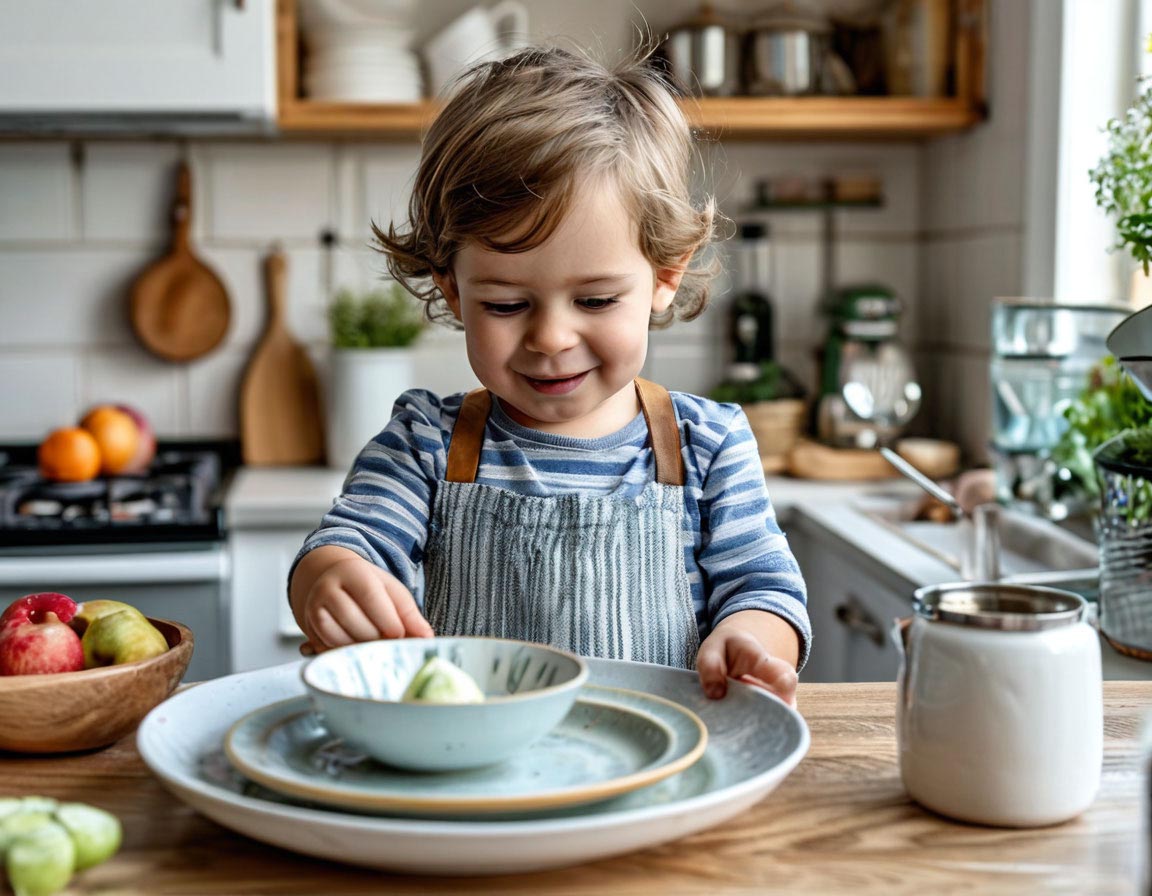
Daily household tasks provide structure and routine, helping children develop responsibility in a manageable way. Below are suitable chores for six-year-olds that promote independence while ensuring safety.
Cleaning Up Toys and Play Areas 🧸
Encouraging children to tidy up their play areas teaches organization and accountability. Simple tasks like putting toys back in designated bins or shelving books promote good habits.
✔️ Best Practices:
- Use labeled storage bins or baskets for easy sorting.
- Make cleanup time fun by turning it into a game with a timer.
- Give clear, simple instructions like, “Put all the cars in this bin.”
Helping with Dishes and Kitchen Tasks 🍽️
Introducing basic kitchen responsibilities nurtures self-sufficiency. While six-year-olds are too young for handling sharp or hot objects, they can assist in other safe ways.
✔️ Safe and Easy Tasks:
- Rinsing non-breakable dishes
- Wiping down the table and countertops
- Putting napkins and utensils in place
- Handing clean plates to an adult for stacking
Clearing and Setting the Table 🍴
Mealtime routines help children develop consistency and responsibility. Setting and clearing the table is an easy, repetitive task that enhances coordination and awareness of family mealtime etiquette.
✔️ How to Teach This Skill:
- Show them where each item belongs with a simple place-setting guide.
- Use non-breakable plates and cups for safety.
- Praise their efforts to encourage consistency.
Sorting Laundry and Folding Clothes 🧺
Folding laundry improves fine motor skills and teaches children to care for their belongings. Sorting clothes by color or type introduces early categorization skills, reinforcing basic math and logic.
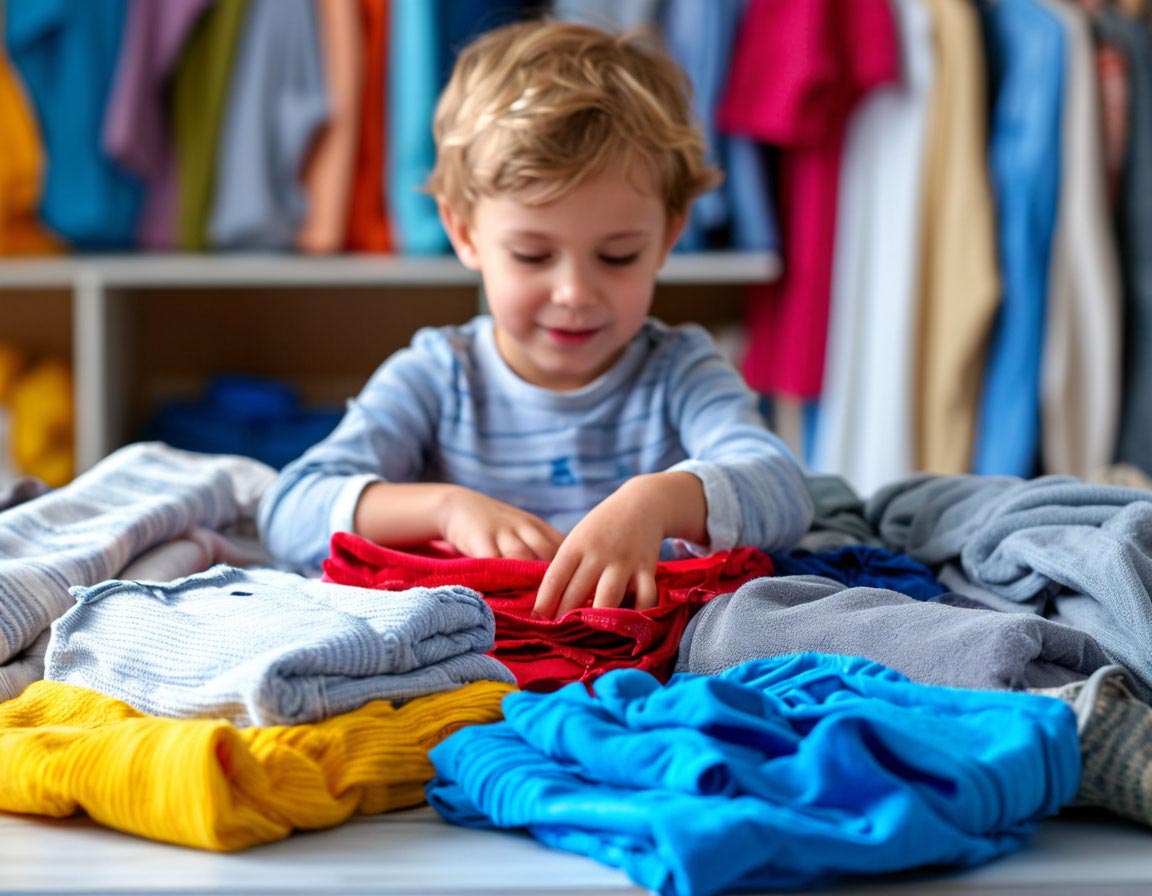
✔️ Tasks They Can Handle:
- Matching socks
- Folding washcloths, small towels, and t-shirts
- Putting their folded clothes in the correct drawers
Taking Care of Pets and Feeding Them 🐶
Pet care instills empathy and responsibility. Simple tasks like refilling a pet’s water bowl or measuring food help children develop nurturing skills.

✔️ Easy Pet-Related Chores:
- Pouring kibble into a dish with supervision
- Brushing a pet with a soft brush
- Checking that water bowls are full
Emptying Small Trash Cans and Basic Cleaning 🧹
Simple cleaning tasks introduce good hygiene habits and awareness of personal space. Emptying the bedroom or bathroom trash cans and wiping surfaces are manageable tasks for a six-year-old.
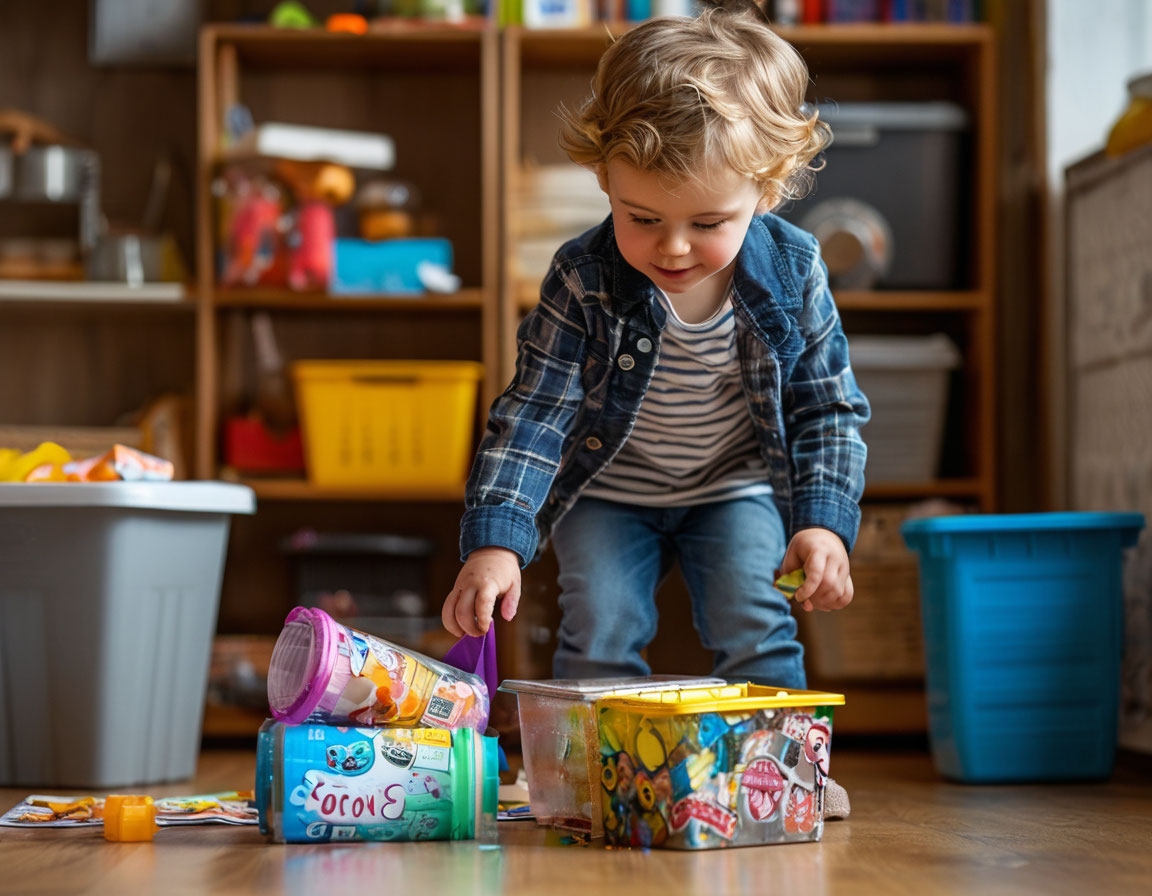
✔️ Suggested Cleaning Chores:
- Wiping spills with a damp cloth
- Using a handheld vacuum for small messes
- Emptying small bins into the main trash can
Chores for 6 and 7-Year-Olds: Outdoor Tasks
Outdoor chores provide children with fresh air, physical activity, and a sense of accomplishment. These tasks help develop coordination, responsibility, and an appreciation for nature.
Watering Plants and Simple Gardening 🌱
Introducing kids to basic gardening tasks fosters patience and an understanding of how plants grow. Six-year-olds can easily water plants using a small watering can or help plant flowers and vegetables under supervision.
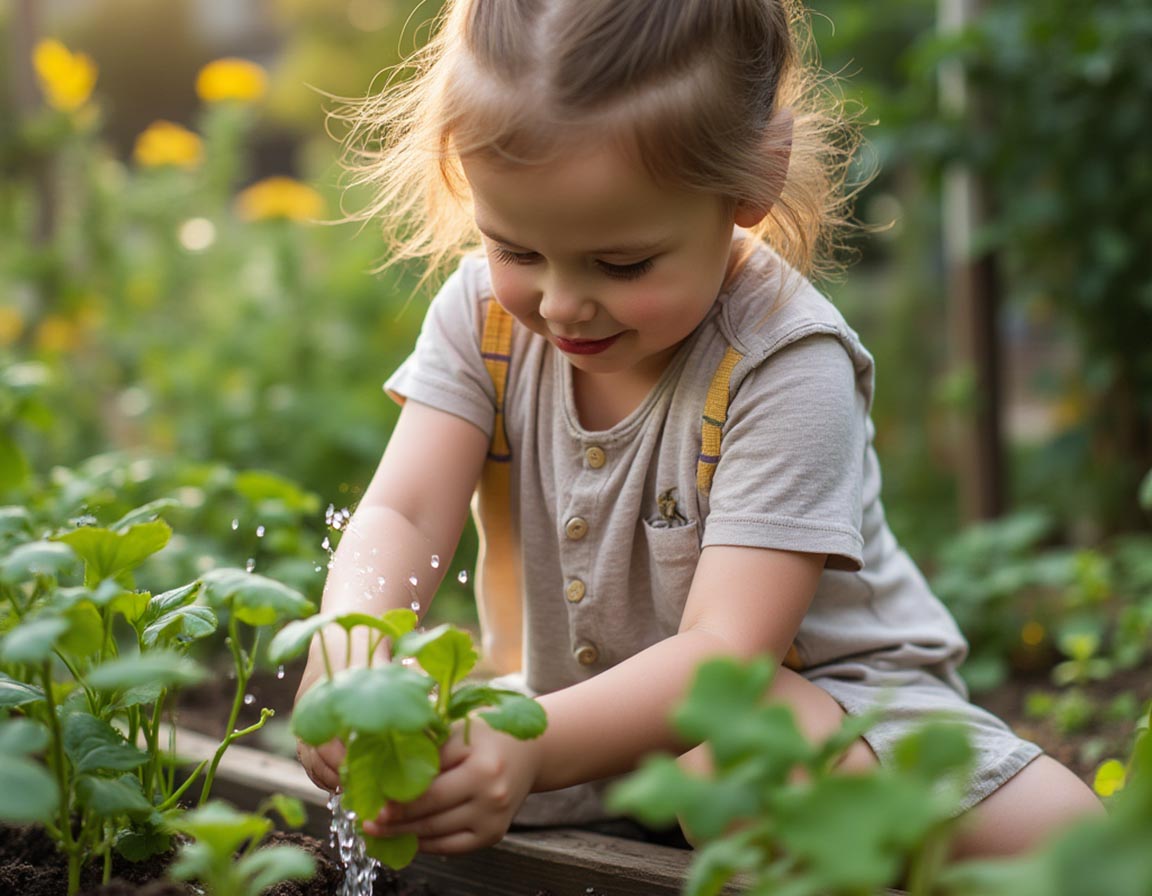
✔️ How to Make It Engaging:
- Let them choose a small plant to care for.
- Use a spray bottle for delicate flowers.
- Teach them how to identify weeds versus plants.
Raking Leaves and Yard Maintenance 🍂
Raking leaves and collecting small debris helps children develop motor skills while contributing to household upkeep. They may not be able to handle a full-sized rake, but kid-friendly versions make the task manageable.
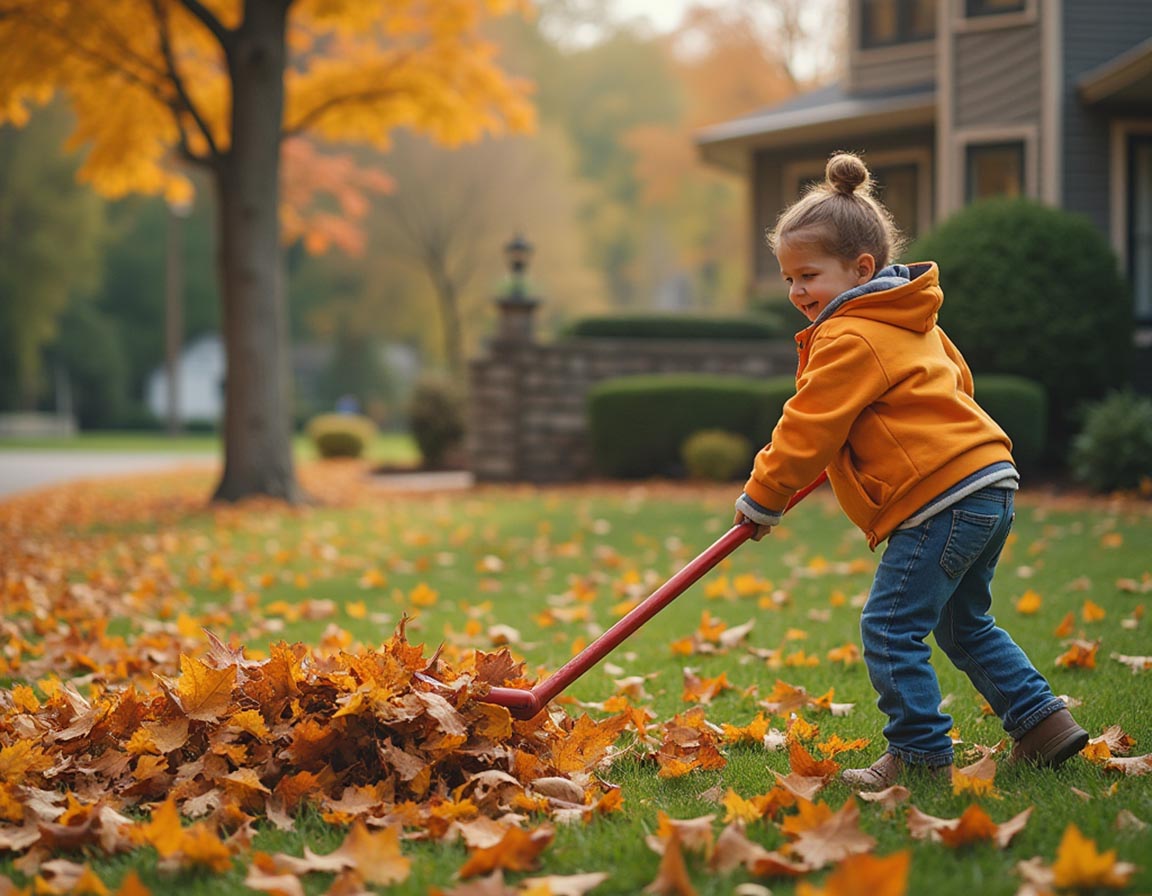
✔️ Best Practices:
- Provide a child-sized rake for easier use.
- Make it a game by seeing who can gather the biggest pile.
- Let them jump in the leaves as a reward.
Picking Up Outdoor Toys and Tidying Spaces
Keeping outdoor areas tidy teaches children organization and responsibility. Simple tasks like putting away bikes, balls, and garden tools prevent clutter and create safe play areas.
✔️ Tips for Success:
- Use labeled bins for toy storage.
- Assign a specific area for outdoor items.
- Set a timer to make tidying up quick and fun.
Additional Household Chores
Beyond regular chores, six-year-olds can assist with small household responsibilities that make daily routines smoother.
Helping with Younger Siblings
Older siblings can take on simple caregiving tasks, such as bringing a pacifier, singing a song, or handing over a toy. While they shouldn’t be responsible for full supervision, small acts of kindness help develop empathy.
✔️ Safe Tasks:
- Fetching diapers or wipes.
- Entertaining a younger sibling with a story.
- Assisting with picking up toys.
Bringing in the Mail 📬
A small yet meaningful task, retrieving the mail introduces kids to responsibility and gives them a sense of independence.

✔️ How to Encourage Participation:
- Turn it into a daily ritual.
- Let them sort letters by family member.
- Supervise when crossing driveways or sidewalks.
Simple Kitchen Help with Meal Prep 🍎
Children enjoy helping in the kitchen when given age-appropriate tasks. Meal prep fosters an early appreciation for cooking while teaching safety and hygiene.

✔️ Tasks They Can Handle:
- Washing fruits and vegetables.
- Stirring pancake batter or mixing ingredients.
- Arranging simple snacks, like crackers and cheese.
Making Chores For Kids Fun and Engaging
Turning chores into a positive experience increases motivation and prevents resistance. Gamifying tasks with timers, reward charts, or fun music can make them feel like a challenge rather than a duty. Allowing kids to choose their favorite chores or work alongside a parent adds an element of independence and connection.
Turning Chores into a Game 🎲
Gamifying tasks transforms routine responsibilities into exciting challenges.
✔️ Ideas to Try:
- Set a timer and see who finishes first.
- Use a “mystery chore” system where kids draw a task from a jar.
- Create a scavenger hunt for misplaced toys.
Using a Chore Chart for Motivation 📋
Visual chore charts provide structure and make it easy for kids to track progress.
✔️ Best Practices:
- Use stickers or checkmarks for completed tasks.
- Display the chart in a visible location.
- Rotate chores weekly to keep things fresh.
Reward Systems and Positive Reinforcement ⭐
Acknowledging effort builds confidence and encourages consistency. Rewards don’t have to be material—verbal praise, extra playtime, or a special outing can be just as motivating.
✔️ Examples of Reward Systems:
- Earn points for completing chores, redeemable for small treats.
- Create a weekly “helper of the house” title.
- Offer a fun family activity as a reward for consistent effort.
Assigning age-appropriate tasks helps six-year-olds build responsibility while contributing to the household in meaningful ways.
Should 6 and 7-Year-Olds Be Rewarded for Chores?
Chores teach children responsibility, discipline, and the importance of contributing to the household. But should they receive rewards for completing tasks? The answer depends on parenting style, household values, and what lesson you want to reinforce.
Allowance vs. Non-Monetary Rewards
Some parents use financial incentives, while others believe chores should be an expected part of family life. Both approaches have benefits:
✔️ Allowance-Based Rewards:
- Teaches kids the value of money.
- Encourages saving and smart spending habits.
- Helps children understand the connection between work and rewards.
✔️ Non-Monetary Rewards:
- Reinforces intrinsic motivation.
- Encourages a teamwork mindset rather than a transactional approach.
- Builds a habit of helping without expecting compensation.
Teaching Financial Responsibility Through Chores
If allowance is tied to chores, it becomes an early financial lesson. Kids can learn how to:
- Save – Set aside money for larger purchases.
- Spend Wisely – Make decisions about wants vs. needs.
- Give – Donate a portion to charity or a cause they care about.
A simple strategy is dividing earnings into three labeled jars: Save, Spend, and Give. This method provides a tangible way for kids to understand money management.
Finding the Right Balance for Your Family
A hybrid approach works for many families. Some tasks, like making the bed and picking up toys, are expected. Others, such as washing the car or organizing a closet, may come with a small reward. Setting clear boundaries helps children distinguish between responsibilities and optional tasks. The key is consistency—kids should understand which chores are obligations and which offer an incentive, ensuring they develop a balanced sense of duty and motivation.
Tips for Parents Assigning Age-appropriate Chores
Assigning tasks should be about building independence, not creating stress. The goal is to encourage participation without making chores feel like punishment.
Keeping Instructions Clear and Simple
At six years old, kids respond best to straightforward guidance. Instead of saying, “Clean your room,” break it down into steps:
- Put all toys in the bin.
- Place books on the shelf.
- Pull up the bed covers.
Visual chore charts with pictures can also help younger children remember their responsibilities.
Setting Realistic Expectations
Tasks should be developmentally appropriate. A six-year-old may not fold laundry perfectly or sweep the floor without missing a few spots. What matters is participation, not perfection. Acknowledge effort with encouragement: “Great job putting your clothes away!” rather than pointing out mistakes.
Encouraging Independence Without Perfectionism
Allow kids to take ownership of their chores, even if they don’t do them exactly how you would. Overcorrecting can discourage their willingness to help. If a towel is folded imperfectly, resist refolding it in front of them—celebrate their effort instead.
Maintaining a Consistent Routine
Repetition helps children develop responsibility. Assigning chores at the same time each day, like before dinner or after school, establishes a predictable routine.
✔️ Ways to Make Chores a Habit:
- Tie them to daily activities, such as setting the table before meals.
- Use a chore chart with stickers or checkmarks.
- Offer praise and small incentives to keep motivation high.
What Experts Advise on Setting Age-appropriate Chores for Children
American Academy of Child and Adolescent Psychiatry (AACAP): The AACAP notes that 6- to 7-year-olds can wipe tables and counters, put laundry away, and sweep floors.
Cleveland Clinic: According to the Cleveland Clinic, children in early elementary school can help pack their lunch, assist with meal preparation, set and clear the table, load and unload the dishwasher, keep their room organized, put away clean clothes, and keep floors clean by vacuuming or sweeping.
Frequently Asked Questions About Chores for 6-7 year olds
Age-appropriate chores for 6 and 7 year olds include simple tasks like cleaning up toys, wiping counters, setting the table, and feeding pets. These tasks help children build practical life skills and foster a sense of pride in contributing to the family.
A 7 year old should typically manage two to four simple chores daily. Consistent, manageable chores help kids start learning some valuable skills while avoiding overwhelm.
Assigning age-appropriate chores for children teaches responsibility, promotes independence, and supports motor skill development. It ensures tasks match a child’s abilities, helping them succeed and stay motivated.
Examples of age-appropriate chores for 6-7 year olds include folding laundry, helping water plants with a garden hose, feeding pets, and taking out the garbage. These tasks are safe, manageable, and allow children to feel useful.
To make chores fun, turn them into games, use timers, create a chore chart into three columns (for daily, weekly, and extra chores), and offer small rewards. Getting kids involved in designing the chart can make them more excited about helping out around the house.
When you give your kids chores early, you teach your children responsibility, teamwork, and resilience. Managing simple chores helps children learn practical life skills they will need when taking on more responsibility and handling chores as an adult.
Instead of relying solely on money, rewarding your kids can include praise, extra playtime, or choosing a new chore to master. If you want to introduce them to money management, you can split your chore chart into three jars: Save, Spend, and Give, helping them understand the link between work and money.
